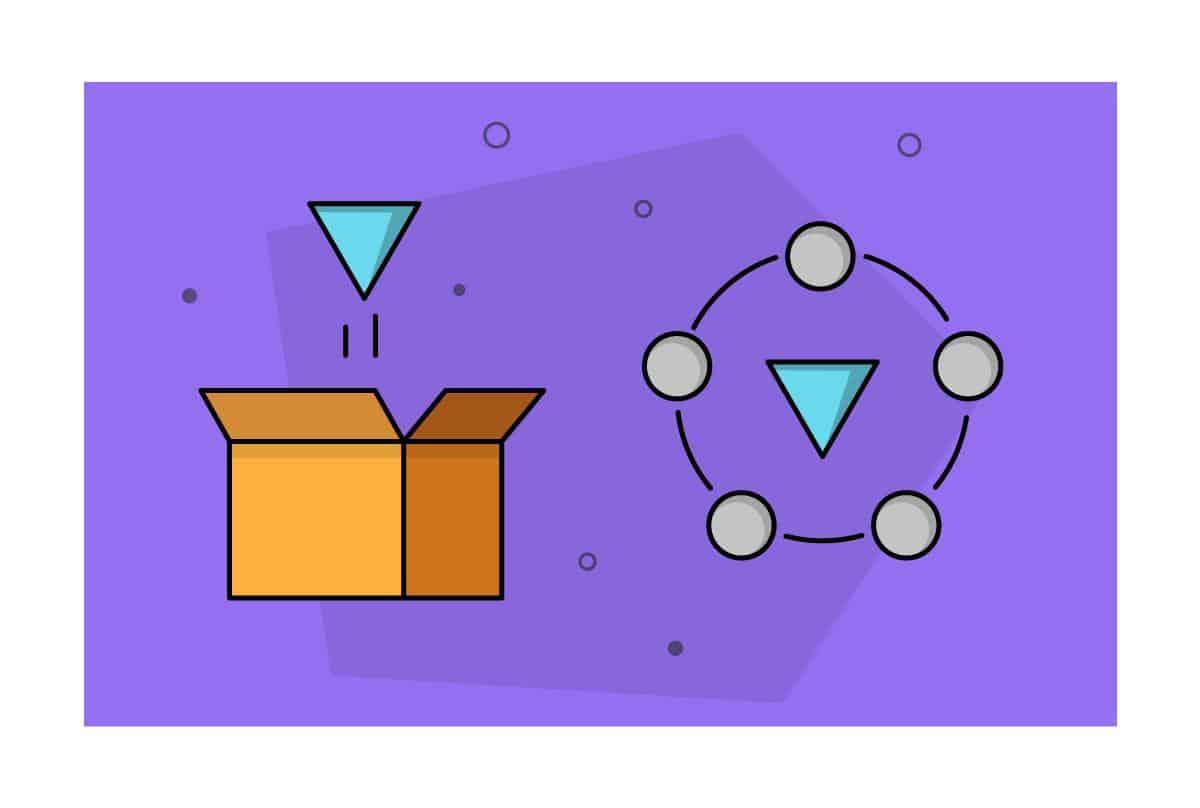Imagine you’re 10 years old, biking through a suburban neighborhood on a hot summer day. Sweat trickles down your forehead, and you notice a kid on a corner, selling lemonade behind a makeshift counter. While watching her frantically trying to make new product while juggling transactions with customers, you’re struck with inspiration.
You pedal home, pull out a pencil and paper, and sketch out designs for the Lemonationizer™—a quick and inexpensive way to make consistent, delicious lemonade. Ingredients are automatically cleaned, measured, and mixed, waste is efficiently discarded, and all power is generated via foot pedals, leaving your hands free to handle cash and focus on customer service.
Congratulating yourself for your brilliance, you let the pencil fall to the table and consider your next move.
Do you open your own stand and hope to dominate market due to the novelty of your proprietary methods? Do you try to license the Lemonationizer technology to lots of existing stands, or sell the rights to just one for a clean profit?
At the heart of these options is one key question that all entrepreneurs must answer:
Do you have a business or a product?
It’s incredibly important that you make this distinction, and do so early on. Your early decisions, business model, long-term trajectory, costs, and workload will all vary drastically depending on which path you choose. Making the right decision now could mean the difference between a windfall of profit and a complete mess.
Below, I’ll break down the difference between a product (the Lemonationizer) and a business (a lemonade stand featuring the Lemonationizer) in ways you may not have considered, and leave you with a clear understanding of the pros and cons of each, as well as actionable steps you can take to be sure you’re aligning your entrepreneurial efforts with the right approach.
So, Do You Have a Business or a Product?
I’ve invented a Lemonationizer in the past.
Well, not exactly. I actually developed a financial technology product that allowed novice investors to visualize groups of securities in an innovative way. It was truly a product, not a business.
I’ve also worked for lemonade stands. That is to say, I’ve worked for both small and large companies that were inarguably businesses. Their values were in service offerings, product sales, licensing, syndication, and building strong customer relationships—not necessarily the novelty of the services or products they offered.
Lastly, and perhaps most importantly, I’ve been part of a lemonade stand (business) that should have been a Lemonationizer (product). I worked for several years in a leadership capacity for an early-stage technology startup that tried to compete in a saturated landscape and—after many challenges and expensive failed attempts to gain market traction—ended up selling or licensing the technology to established market leaders.
Looking back, they should have solely focused on their technology product instead of building a business around it. Understanding their best path to success earlier on would have saved them a lot of heartache and millions of dollars.
Now, years later, I spend a lot of time developing emerging leaders and guiding startups. In doing so, I often meet entrepreneurs who—seduced by the startup dream—default to a business approach without considering the fact that all signs have been pointing them toward a product-only focus.
If this article forces even a single entrepreneur to reevaluate their trajectory and save them from wallet-drain and heartache, it will have been worth all the typing.
The Difference Between a Product and a Business
A product—put simply—is a thing. This could mean an idea, physical product, platform, proprietary methodology, tangible creative output, or technology. For the sake of this article, we’ll use product to specifically mean something of this nature for which you can sell the rights or which you can license to another entity (as opposed to building a business around it). So even if you wanted to create a business around the product, that is still a business, since you aren’t licensing the product to another entity.
A business is a means by which to serve individuals, other businesses, or communities by providing them with services or products, whether those products are your creation that you’re selling or someone else’s that you’re reselling, licensing, or marketing. For the sake of this article, when we talk about businesses, we’ll focus on businesses that leverage products of your own creation.
If you’re unsure which better applies to you, consider that you may have a business if:
- By nature, in order to provide value or generate revenue, you rely on the public or other businesses to engage with your service or product offering(s); or
- On their own, your product offerings wouldn’t likely provide value to other similar businesses or competitors so you would likely not be able to license it.
A restaurant is a business. A barbershop or yoga studio is a business. A squad of personal trainers is a business. An ecommerce store selling skateboards is a business.
By contrast, a new type of shampoo is a product. While you could build a business around your product, the product has intrinsic market value on its own, and thus presents you with options to get it to market through channels that are often far less complex.
Unless your end goal is to compete with enormous brands like Head & Shoulders, Pantene, and Suave, deal with manufacturing facilities, FDA compliance, marketing, conversion analytics, and shipping logistics, and convince investors to believe in and fund your journey down that path.
I don’t know about you, but the idea of searching for a new director of shampoo regulatory affairs for my shampoo business sounds awful to me. Unless you possess a nearly vengeful degree of focused passion for becoming a shampoo mogul, I urge you to consider your idea a product and get someone else to license it.
You may have a product if:
- You have an idea that’s novel or interesting and that could provide value to established businesses or competitors in an existing market; and
- The sole point of building a business around your idea would be to take the idea to market (that is to say, there is no deeper vision or mission driving your decisions)
The tricky part is, many ideas aren’t quite cut and dry, and could fall into either camp. Consider the Lemonationizer. Consider the technology startup I mentioned I worked at.
My partner and I opened an LLC, submitted patent applications, and built both prototypes and fully operational versions of our software (product). We developed branding, established a web presence, and all that comes along with building a robust product.
When investors began approaching us, interested in developing a plan to help us take the product to market and build a business around it, we didn’t engage, as our interest was never in launching a financial tech startup. We wanted to solve a problem—to get our idea into the hands of an existing market leader with the expertise, resources, experience, and leverage to share our vision with the world. We wanted to give such an established enterprise something that could be refined and marketed in a way that would attract new audiences to their more advanced flagship offerings.
Why?
Both my partner and I were experienced enough to know what was feasible and realistic. We understood what our most direct path to success looked like, and we knew better than to throw our hats into the ring with some of the world’s best-funded banks. Knowing from the start that we wanted to build and share a self-contained product fueled our decisions and trajectory.
The Pros and Cons of Each
Building a product and then working to have it brought to market by other parties is in many ways far less complex than building a business around it. This is usually true simply because the nature of business is itself complex.
I know quite a few businesses that failed, not due to the virtue of the products or services they were offering, but rather due to mismanagement, inexperienced or poor leadership, or compliance/regulatory hurdles. I’ve been involved in a few myself.
However, running a business can be attractive. You may associate a business with increased control over your long-term vision, how your ideas will be represented, and your ability to scale infinitely.
There are quite a few sexy examples of the latter. You may have heard of a company called Google. As a product, the underlying algorithms could have sold early on for as little as $1 million. Now as a business—along with parent company Alphabet and its ever-expanding projects—it’s worth north of $500 billion. You’re not likely to see that type of money with a product.
How Do You Decide Between a Product and a Business?
When you have the option of pursuing your goal with either a product or business focus, how do you decide which path to take?
I’m sorry to tell you, but there’s no one-size-fits-all answer.
You need to consider your individual experience, timeline, risk tolerance, access to capital, and motivations. If you’re on the fence, I would suggest erring on the side of product whenever possible, simply due to the complexity, risk, and requirements inherent in running a business.
Businesses are often more expensive, and difficult to pivot, backtrack upon, and adjust. More importantly, you can expand a product into a business much more easily than you can strip away a business to expose the underlying product.
NOTE: If you need help deciding between a product vs. a business, or you want some guidance for your entrepreneurial journey, a trusted, experienced mentor can help you avoid mistakes and fasttrack your success.
Grab our FREE Mentor guide to learn how to find the right mentor for your business!
Either Way, Always Treat Some Aspects Like a Business
In almost every practical case I’ve come across—
(The sound of a record scratching)
Wait! Pause. I’m not an attorney and the following isn’t legal advice. Consult an attorney, tax professional, masseuse, and psychic.
Okay, keep reading. Ahem.
In almost every practical case I’ve come across, whether you have a product or a business on your hands, it’s worthwhile to treat your undertaking as a business in several key ways, even if you clearly have a product on your hands. Doing so provides you with protections otherwise difficult to attain.
Incorporate No Matter What
If you’re a single individual making art, you may think you don’t need to incorporate (or at least don’t need to until you begin selling a few pieces). However, if you’re engaged in an endeavor that involves monetary exchanges with the public, you’ll want to be careful.
For instance, a good number of professional musicians incorporate in order to protect against lawsuits (and to simplify taxes). If you’re building small sheds, providing services as a voiceover artist, or anything else that meets that criterion—no matter how simple or artistic—you should consider the benefits of incorporation.
The Importance of Liability
If you open an LLC (a limited liability company, a relatively simple business structure), you can reasonably protect your property, personal investments, and savings from lawsuits directed at your business, as long as you don’t pierce the corporate veil. That means intermingling your own finances and the business—you should never pay personal bills from a business checking account or vice versa, etc. There are exceptions to this rule. For instance, when starting out, you can contribute personal money as the business’ basis (how else would you begin?), but in general, treating yourself and the business as two separate entities should keep the veil intact. This is just an example, and other corporate structures offer similar protections.
Protect yourself.
Keeping your finances separate isn’t that hard to do. Once you form a business entity—which you can do online—and have the official paperwork, you can then take them to a bank and open a dedicated business checking account. From here, you can set up debit or credit cards in the name of the business for online purchases, etc. Once you’ve created a means by which to make purchases as the business, you need to protect the veil.
If your endeavor sits squarely in the product category, beyond the steps outlined above, you don’t need to behave like a business. Keep things simple and lean. Insure only things you truly need to insure, but don’t fail to insure something you should. Always seek to balance risk and practicality.
Beyond protecting yourself from legal liability, there are a handful of other business-like things you’ll want to do, regardless of whether you’re taking the product or business path:
- Understand your business model and how you’re going to make money
- Get to know your audience
- Develop consistent branding
- Define your pitch and value proposition
- Consider how this pursuit will impact your personal life
- Know you’ll be the public face of the endeavor
- Conduct yourself in ways that align with the brand’s values
Product vs. Business: How Your Approach Should Differ
Now that you have a sense of some of the things you should do no matter what, let’s talk about how your approach might differ based on whether you develop a product or a business.
Things you should do if you have a product:
- Protect your intellectual property. Without this, you have nothing. Protect your ideas with patents, trademarks, copyrights, and trade secrets, and protect those protections with non-disclosure agreements. Only once you’ve done this can you communicate about it freely.
- Develop your product’s story. You should be able to concisely articulate your product’s uniqueness and justify market demand. If it’s well-constructed, your story should scale effortlessly from an elevator conversation or tweet all the way to a short book or TED talk. It should invoke compelling imagery.
- Network and connect. Begin to develop a list of industries, companies, and individuals you believe would benefit from your product. Come up with plans to get your idea in front of them, but be sure you only engage with them once you’re ready. You never get a second chance to make a first impression.
Things you should do if you have a business:
- Build the right culture. Especially in technology spaces, a trust-based culture attracts and retains top talent, and is in many ways easier to maintain than one based on micromanagement.
- Focus on the customer’s journey. Mercedes Benz CEO Steve Cannon once said “customer service is the new marketing.” If your customers are ecstatic, they’ll become promoters and your company will grow. I can think of several companies with whom I’ve had exceptional experiences, and have remained a loyal customer despite their selling less-than-stellar products. I believed in them and wanted them to succeed.
- Understand the terrain. Are you building an online business? Do you need a brick-and-mortar? What is the competitive landscape like (locally, nationally, internationally)? Know what you’re getting into.
NOTE: If you need help deciding between a product vs. a business, or you want some guidance for your entrepreneurial journey, a trusted, experienced mentor can help you avoid mistakes and fasttrack your success.
Grab our FREE Mentor guide to learn how to find the right mentor for your business!
Whether Product or Business, Decide and Go For It
Details aside, the core principle here is fairly simple: If you have an entrepreneurial goal, decide early on whether you have a business or a product, and make decisions that reflect that goal.
Remind yourself often of your approach. Sometimes the choice is obvious, and sometimes it’s not. Regardless, you need to stick with your decision with everything you’ve got. To quote Einstein, keep things as simple as possible, but no simpler. And then go crush it. Actually, I added the last part.
Leave comments! Ask questions! I love this stuff.


















